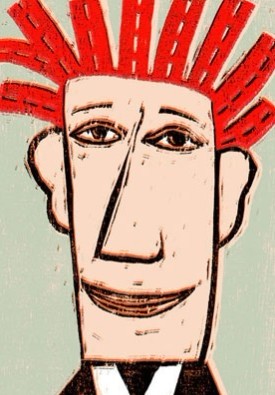Book Review;
Eli Broad
Uncommonly unreasonable
The Art of Being Unreasonable: Lessons in Unconventional Thinking.

Few businessmen have achieved as much as Eli Broad. Not only did he develop two Fortune 500 businesses from scratch (and launch a third), he has also been a serial entrepreneur in the arts. Mr Broad backed Jeff Koons and Cindy Sherman, and founded the Museum of Contemporary Art in Los Angeles (MoCA). This son of the Bronx now calls the City of Angels home and has set out to give it a new heart by driving the development of a downtown area with a strong emphasis on culture. He has also been a significant and controversial philanthropist, funding scientific research and failing schools.
埃利·布羅德的成就在商人中幾乎無人可敵。不僅在于他從零開始創辦了兩家世界500強的企業(并且正在著手建立第三家),而且他還多次投資藝術類項目。布羅德先生是杰夫·昆斯和辛迪·舍曼的資助人,還建立了洛杉磯當代藝術博物館(MoCA)。出生在布朗克斯的他如今已視洛杉磯為家,并著手開發這座城市的一片鬧市區,著重發展文化主題,打造一個新的城市中心。他曾一度是位舉足輕重又飽受爭議的慈善家,成功建立科研機構但籌建學校卻差強人意。
Mr Broad's straight-to-the-point narrative—165 pages of text with a 12-page appendix of his “career highlights” and just the minimum colour necessary to illustrate the important lessons that life has taught him—is part of what he is trying to convey about himself. Where, say, Jack Welch spews out hundreds of pages in “Jack: Straight From the Gut” (2001) and Richard Branson spares no detail as he explains how he has spent his life trying to “Screw Business As Usual” (2011), Mr Broad has delivered a book that is as brief as he likes to keep everything else in life (“I never stay anywhere—parties, museums, meetings—longer than three hours,” he explains in a chapter entitled “How to Work 24/7 and Still Get 8 Hours of Sleep”).
布羅德先生的文章開門見山,直擊主題。文章正文共165頁,12頁的附錄中列舉了他的“事業亮點”,文章并不華麗,平淡地講述了他的生活教訓,但這些都只是他傳達自我的冰山一角。杰克·韋爾奇在他的《杰克·韋爾奇自傳》(2001)中洋洋灑灑寫了幾百頁,同樣理查德·布蘭森不遺余力事無巨細地講述了他《輕松玩商業》的故事,但布羅德的書卻簡潔明了,正如他在日常生活中喜歡一切從簡那樣。(正如他在“如何在滿負荷工作中睡夠8小時”這一章中說明的:“不論是聚會、博物館還是會議,我在一個地方從不會停留3小時以上。”)
The brevity of his autobiography is both a strength and a weakness. Messrs Welch and Branson devote much of their books to selling themselves as heroes, whereas Mr Broad's tendency to state the facts and move on often undersells how challenging a life he has led, and how hard won have been his triumphs. He writes of being amused at how films about successful people often condense the “critical ingredient to their success” into “moments overlaid with catchy music”, yet his book does that without the soundtrack.
他的自傳簡潔明了,是優點也是缺點。韋爾奇和布蘭森都在自己的書中都用很大的篇幅把自己渲染成英雄,而布羅德卻傾向于平鋪直敘地講述事實,根本不足以將充滿挑戰的生活和艱難取勝的事跡作為賣點。他在書中寫道,電影常常把成功人士的“成功必備要素”簡短截拍成“悅樂相伴的瞬間”,總引他發笑,但在他的書中,他如法炮制,只是沒了配樂。
For instance, the controversial story of how he fell out with the board of MoCA, which he co-founded in 1980 and then rescued when it came to the brink of liquidation in 2008, is given a mere page, when it alone could have filled an entire book. And he writes nothing about how he fell out with the board at the Los Angeles County Museum of Art, let alone about MoCA's more recent troubles.
例如,他在1980年是洛杉磯當代藝術博物館的創建人之一,后雖與博物館的董事會幾經爭吵,但他還是在2008年博物館面臨破產倒閉之時挽回了局面,單單這個故事就足以寫作一整本書,但這個眾說紛紜的故事在書中僅占據了一頁篇幅。他只字未提是怎樣陷入與洛杉磯藝術博物館董事會的爭吵中的,讀者也就更無從知道當代藝術博物館新近的麻煩了。
On the other hand, distilling a lifetime into a series of practical lessons has clearly pushed Mr Broad to do some hard thinking and self-analysis, which makes his book a useful read, especially for anyone engaging in entrepreneurship or philanthropy. His personality comes through clearly enough, though one can quibble over whether his choice of “unreasonable” to describe it is exactly right. Mr Broad means it in the same way George Bernard Shaw did, when he said that the unreasonable man “persists in trying to adapt the world to himself. Therefore, all progress depends upon the unreasonable man.” Mr Broad started adapting the world to himself at an early age, telling classmates to rhyme his name with “road”, rather than his immigrant father's “rod”. But he also adapted himself to the world, not least in fighting to overcome dyslexia, which he says gave him a work ethic that infuses every part of his life (perhaps too much: he describes his six-decade marriage to Edye in glowing terms, but regrets spending too little time with his growing sons).
另一方面,布羅德要將自己的一生濃縮成一系列的實踐指導,就必然迫使他深入地思考,進行自我分析,也就讓他的書讀來十分實用,對于那些致力于企業產業和慈善事業的人則更甚。他的個性在書中展露無遺,不過人們對于到底是否應該用 “不講道理”來形容這種個性可能還會有爭議。這和喬治·蕭伯納的理解一致,他曾說過:不講道理的人會“固執地讓整個世界來適應自己。因此,世上所有的進步都來自于不講道理的人。”布羅德年輕時就想擺脫父親的移民姓氏“布婁德”,為了押韻讓同學們叫他“布羅德”,從那時起他就開始讓世界適應自己了。不過他也努力去適應這個世界,尤其是他為克服閱讀障礙做出的努力,他認為那讓一種職業道德滲透在他生活的方方面面(或許有點過分:他覺得與易迪亞60年的婚姻仍然激情澎湃,但后悔沒有花時間多與兒子相處,陪他一同成長)。
Being a solitary child made him less prone than many people to going along with the crowd, and he likes nothing better than to challenge conventional wisdom with a “why not?”. Those are good attributes for an entrepreneur, though they are unlikely to make him loved in the world of art philanthropy, where his “candour” often “ruffled feathers”. (He claims several times not to care what people think of him, but he doth protest too much.) Still, unlike many of his peers among the current generation of American billionaire philanthropists, he does consider giving to the arts a good investment, to “bring beauty, inspiration, and the shock of the new to as many people as possible”.
布羅德從小生性孤僻,與旁人相比不愿多在人群中相處,他最喜歡挑戰世俗觀點,說上一句:“為什么不能!”。企業家擁有這些特性再好不過,但在藝術品慈善界就不大行得通,沒能讓他廣受歡迎,因為正直,便常常引得他人惱怒。(他多次聲稱不在乎別人的看法,但他實在是抱怨得太多。)盡管如此,和這一代許多與他同齡的美國億萬富翁慈善家不同,布羅德是真心考慮大力投資藝術,要“將美麗、靈感和新藝術的震撼帶給更多的人”。
Two of his rules of business, in particular, are rarely found in books on entrepreneurship. One is that, rather than being the pioneer, it is often better to be second with a new idea—as he was in launching KB Home, which became his first Fortune 500 firm, selling houses that were cheaper because they had no basement, a controversial idea at the time copied from a firm in another state. (“The second guy can just charge along the path the first guy has marked, avoiding the rough patches where he stumbled.”)
他有兩條商業規則很特別,在同類企業書籍中很少提及。一是與其做個開拓者,不如做個有新點子的后來者。他就是這樣創辦了他的第一家世界500強企業科比房(KB Home),出售無地下室所以便宜的房子,這個想法效仿了國外的一家公司,在當時頗受爭議。(“后來者有前人之路可循,還能避免開拓者走過的彎路。”)
This second rule challenges the conventional wisdom that the safest diversification is into an industry closely related to your own: after several years and a great deal of research, Mr Broad built his second Fortune 500 firm in an entirely unrelated business: financial products for retirement. He may call himself unreasonable, but in this short book, Mr Broad manages to talk a lot of sense.
人們通常認為最安全的多樣化轉型是朝現有產業的相關領域發展,但布羅德的第二條規則就挑戰了這一觀點:經過大量調查,歷時數年,布羅德在毫不相干的領域創辦了他的第二家500強企業,涉足退休理財產品行業。布羅德也許評價自己是個不講道理、不可理喻的人,但在這本薄薄的書中,他還是講出了很多道理。











